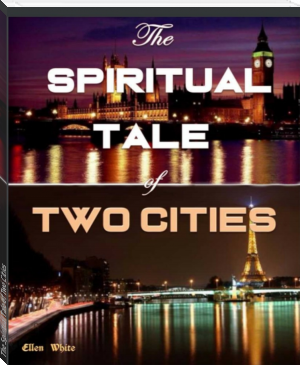Insurgency, Ellen Gould-Harmon [good novels to read in english .TXT] 📗

- Author: Ellen Gould-Harmon
Book online «Insurgency, Ellen Gould-Harmon [good novels to read in english .TXT] 📗». Author Ellen Gould-Harmon
The prophet Jeremiah, looking forward to this fearful time, exclaimed: "I am pained at my very heart. . . . I cannot hold my peace, because thou hast heard, O my soul, the sound of the trumpet, the alarm of war. Destruction upon destruction is cried." Jeremiah 4:19, 20. "That day is a day of wrath, a day of trouble and distress, a day of wasteness and desolation, a day of darkness and gloominess, a day of clouds and thick darkness, a day of the trumpet and alarm." Zephaniah 1:15, 16. "Behold, the day of the Lord cometh, to lay the land desolate: and He shall destroy the sinners thereof out of it." Isaiah 13:9.
In view of that great day the word of God, in the most solemn and impressive language, calls upon His people to arouse from their spiritual lethargy and to seek His face with repentance and humiliation: "Blow ye the trumpet in Zion, and sound an alarm in My holy mountain: let all the inhabitants of the land tremble: for the day of the Lord cometh, for it is nigh at hand." "Sanctify a fast, call a solemn assembly: gather the people, sanctify the congregation, assemble the elders, gather the children: . . . let the bridegroom go forth of his chamber, and the bride out of her closet. Let the priests, the ministers of the Lord, weep between the porch and the altar." "Turn ye even to Me with all your heart, and with fasting, and with weeping, and with mourning: and rend your heart, and not your garments, and turn unto the Lord your God: for He is gracious and merciful, slow to anger, and of great kindness." Joel 2:1, 15-17, 12, 13.
To prepare a people to stand in the day of God, a great work of reform was to be accomplished. God saw that many of His professed people were not building for eternity, and in His mercy He was about to send a message of warning to arouse them from their stupor and lead them to make ready for the coming of the Lord. This warning is brought to view in Revelation 14. Here is a threefold message represented as proclaimed by heavenly beings and immediately followed by the coming of the Son of man to reap "the harvest of the earth." The first of these warnings announces the approaching judgment. The prophet beheld an angel flying "in the midst of heaven, having the everlasting gospel to preach unto them that dwell on the earth, and to every nation, and kindred, and tongue, and people, saying with a loud voice, Fear God, and give glory to Him; for the hour of His judgment is come: and worship Him that made heaven, and earth, and the sea, and the fountains of waters." Revelation 14:6, 7.
This message is declared to be a part of "the everlasting gospel." The work of preaching the gospel has not been committed to angels, but has been entrusted to men. Holy angels have been employed in directing this work, they have in charge the great movements for the salvation of men; but the actual proclamation of the gospel is performed by the servants of Christ upon the earth. Faithful men, who were obedient to the promptings of God's Spirit and the teachings of His word, were to proclaim this warning to the world. They were those who had taken heed to the "sure word of prophecy," the "light that shineth in a dark place, until the day dawn, and the daystar arise." 2 Peter 1:19. They had been seeking the knowledge of God more than all hid treasures, counting it "better than the merchandise of silver, and the gain thereof than fine gold." Proverbs 3:14. And the Lord revealed to them the great things of the kingdom. "The secret of the Lord is with them that fear Him; and He will show them His covenant." Psalm 25:14.
It was not the scholarly theologians who had an understanding of this truth, and engaged in its proclamation. Had these been faithful watchmen, diligently and prayerfully searching the Scriptures, they would have known the time of night; the prophecies would have opened to them the events about to take place. But they did not occupy this position, and the message was given by humbler men. Said Jesus: "Walk while ye have the light, lest darkness come upon you." John 12:35. Those who turn away from the light which God has given, or who neglect to seek it when it is within their reach, are left in darkness. But the Saviour declares: "He that followeth Me shall not walk in darkness, but shall have the light of life." John 8:12. Whoever is with singleness of purpose seeking to do God's will, earnestly heeding the light already given, will receive greater light; to that soul some star of heavenly radiance will be sent to guide him into all truth.
At the time of Christ's first advent the priests and scribes of the Holy City, to whom were entrusted the oracles of God, might have discerned the signs of the times and proclaimed the coming of the Promised One. The prophecy of Micah designated His birthplace; Daniel specified the time of His advent. Micah 5:2; Daniel 9:25. God committed these prophecies to the Jewish leaders; they were without excuse if they did not know and declare to the people that the Messiah's coming was at hand. Their ignorance was the result of sinful neglect. The Jews were building monuments for the slain prophets of God, while by their deference to the great men of earth they were paying homage to the servants of Satan. Absorbed in their ambitious strife for place and power among men, they lost sight of the divine honours proffered them by the King of heaven.
With profound and reverent interest the elders of Israel should have been studying the place, the time, the circumstances, of the greatest event in the world's history--the coming of the Son of God to accomplish the redemption of man. All the people should have been watching and waiting that they might be among the first to welcome the world's Redeemer. But, lo, at Bethlehem two weary travellers from the hills of Nazareth traverse the whole length of the narrow street to the eastern extremity of the town, vainly seeking a place of rest and shelter for the night. No doors are open to receive them. In a wretched hovel prepared for cattle, they at last find refuge, and there the Saviour of the world is born.
Heavenly angels had seen the glory which the Son of God shared with the Father before the world was, and they had looked forward with intense interest to His appearing on earth as an event fraught with the greatest joy to all people. Angels were appointed to carry the glad tidings to those who were prepared to receive it and who would joyfully make it known to the inhabitants of the earth. Christ had stooped to take upon Himself man's nature; He was to bear an infinite weight of woe as He should make His soul an offering for sin; yet angels desired that even in His humiliation the Son of the Highest might appear before men with a dignity and glory befitting His character. Would the great men of earth assemble at Israel's capital to greet His coming? Would legions of angels present Him to the expectant company?
An angel visits the earth to see who are prepared to welcome Jesus. But he can discern no tokens of expectancy. He hears no voice of praise and triumph that the period of Messiah's coming is at hand. The angel hovers for a time over the chosen city and the temple where the divine presence has been manifested for ages; but even here is the same indifference. The priests, in their pomp and pride, are offering polluted sacrifices in the temple. The Pharisees are with loud voices addressing the people or making boastful prayers at the corners of the streets. In the palaces of kings, in the assemblies of philosophers, in the schools of the rabbis, all are alike unmindful of the wondrous fact which has filled all heaven with joy and praise--that the Redeemer of men is about to appear upon the earth.
There is no evidence that Christ is expected, and no preparation for the Prince of life. In amazement the celestial messenger is about to return to heaven with the shameful tidings, when he discovers a group of shepherds who are watching their flocks by night, and, as they gaze into the starry heavens, are contemplating the prophecy of a Messiah to come to earth, and longing for the advent of the world's Redeemer. Here is a company that is prepared to receive the heavenly message. And suddenly the angel of the Lord appears, declaring the good tidings of great joy. Celestial glory floods all the plain, an innumerable company of angels is revealed, and as if the joy were too great for one messenger to bring from heaven, a multitude of voices break forth in the anthem which all the nations of the saved shall one day sing: "Glory to God in the highest, and on earth peace, good will toward men." Luke 2:14.
Oh, what a lesson is this wonderful story of Bethlehem! How it rebukes our unbelief, our pride and self-sufficiency. How it warns us to beware, lest by our criminal indifference we also fail to discern the signs of the times, and therefore know not the day of our visitation. It was not alone upon the hills of Judea, not among the lowly shepherds only, that angels found the watchers for Messiah's coming. In the land of the heathen also were those that looked for Him; they were wise men, rich and noble, the philosophers of the East. Students of nature, the Magi had seen God in His handiwork. From the Hebrew Scriptures they had learned of the Star to arise out of Jacob, and with eager desire they awaited His coming, who should be not only the "Consolation of Israel," but a "Light to lighten the Gentiles," and "for salvation unto the ends of the earth." Luke 2:25, 32; Acts 13:47. They were seekers for light, and light from the throne of God illumined the path for their feet. While the priests and rabbis of Jerusalem, the appointed guardians and expounders of the truth, were shrouded in darkness, the Heaven-sent star guided these Gentile strangers to the birthplace of the newborn King.
It is "unto them that look for Him" that Christ is to "appear the second time without sin unto salvation." Hebrews 9:28. Like the tidings of the Saviour's birth, the message of the second advent was not committed to the religious leaders of the people. They had failed to preserve their connection with God, and had refused light from heaven; therefore they were not of the number described by the apostle Paul: "But ye, brethren, are not in darkness, that that day should overtake you as a thief. Ye are all the children of light, and the children of the day: we are not of the night, nor of darkness." 1 Thessalonians 5:4, 5.
The watchmen upon the walls of Zion should have been the first to catch the tidings of the Saviour's advent, the first to lift





Comments (0)